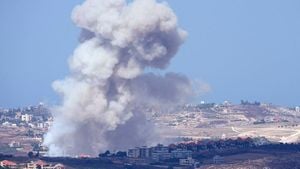U.S. Secretary of State Antony Blinken has echoed calls within the international community for Israel to implement longer pauses in its military operations within Gaza. Speaking from Brussels, Blinken urged for methods to allow humanitarian aid to reach those desperately needing assistance. His statements came after the closure of a 30-day U.S. ultimatum, demanding Israel to take tangible actions toward improving the dire humanitarian situation on the ground. Despite America’s conclusion earlier this week deeming Israel compliant with their laws on humanitarian aid access, it seems the pressing issues remain unresolved.
After reviewing the situation, the State Department declared on Tuesday, following the expiration of the stipulated increments for aid access, "Israel is not blocking aid and hence isn’t violating U.S. law." This assertion, though, starkly contrasts the stark warnings from multiple international aid organizations. Eight distinct organizations have reported Israel's failure to meet U.S. demands aimed at easing access for humanitarian assistance, citing imminent risks of famine across various regions of Gaza. According to experts on food security, without significant intervention, severe food shortages are expected.
"The reality is we’ve seen some steps, but they're not enough to adequately address the hunger crisis and return normalcy," Blinken explained, making it clear Israel needs to greatly improve its efforts. He emphasized the importance of allowing those displaced by military activity back to their homes. Blinken also indicated the necessity for Israel to cancel evacuation orders and reopen commercial routes for trucks carrying aid to Gaza.
“Most significantly,” he added, “we need to see real and extended pauses across substantial areas of Gaza... This is necessary to facilitate the delivery of aid to the people who most desperately need it.” While these pauses are seen as steps forward, some argue they fall far short of addressing the greater humanitarian crisis.
The diplomatic tensions stem from the volatile backdrop of the Israel-Palestine conflict, which drastically escalated following attacks from Hamas on October 7, which resulted in the loss of 1,200 Israeli lives and the taking of over 250 hostages. Since then, more than 43,500 Palestinians have reportedly been killed, the vast majority of whom are civilians, compounded by over 2 million people displaced within Gaza, where much of the infrastructure is now decimated.
President Biden has faced scrutiny for his unwavering support of Israel during these tumultuous times, especially with Trump poised to regain the presidency after Biden's term. Trump's recent commitments lean firmly toward supporting Israel’s strategic depth against Hamas, vowing to obliterate the organization as part of his vision for Middle Eastern stability. Despite his strong backing of Benjamin Netanyahu, he hasn’t elaborated on exactly how he plans to bring lasting peace to the region, which leaves many wary.
Upon the backdrop of recent diplomatic engagements, Blinken underscored his belief the current military operations have fulfilled Israel's stated goals. He remarked, "Israel, by its own benchmarks, has achieved what it set out to do, making now the appropriate time to cease the hostilities." Yet, the fear remains rampant among humanitarian groups concerning potential delays and the immediate consequence could be catastrophic for the civilians still caught amid the conflict.
Faced with impending starvation and rapidly dwindling resources, Gazans are bracing for worsening conditions without urgent international support. With commercial deliveries stalled and evacuation orders sweeping the region, the situation is gradually spiraling out of hand.
For many on the ground, promises of humanitarian aid, albeit reiterated by high-ranking officials, often feel far removed from reality. Critics argue the reality of access to aid remains grim. “Those of us on the receiving end of these political maneuvers feel the real crunch; aid has not been sufficient, and lives are being lost daily to the crushing reality of this conflict,” one aid worker lamented.
The use of force by the Israeli army continues unabated, and recent reports suggest combat operations are intensifying. With the risks of famine gaining attention, food security experts warn there are dire predictions, claiming the situation could deteriorate swiftly if immediate actions are not employed. The lasting impact of these recent military engagements will become evident as the humanitarian crisis deepens.
Further complicity is evidenced by reports of military strikes leading to more civilian casualties. The Health Ministry's figures have indicated at least 43,712 Palestinians have lost their lives since the onset of hostilities following the October incursion. Conditions have become unbearable; the international community increasingly calls for urgent action and sustained efforts toward peace.
Blinken's remarks signify the complexity of the U.S. diplomatic stance, as it grapples with humanitarian obligations against geostrategic alliances. He has acknowledged growing frustration from humanitarian groups, which now demand repetitive action rather than stagnant promises. The juxtaposition of military engagement versus humanitarian relief puts pressure on not only the U.S. but other global leaders to reconsider their responses to this long-standing conflict.
With heightened diplomatic activity expected, the importance of establishing sustainable pauses emerges as foundational for both U.S. foreign policy and the observance of human rights. Humanitarian concerns have often taken backseat to military agendas; Blinken's latest assertions may shift the narrative toward humanitarian action. It becomes undoubtedly clear: aid must be facilitated effectively with no delays, or the consequences of failing to act will haunt the region for generations.
Each moment is precipitating the future of millions. The current strategy and immediate action remain pressing as vulnerability escalates among the already disenfranchised populations within Gaza. The plea is for real, emergent interventions and effective pauses amid the bombardment — without them, the faint hope of bridging differences and restoring humanity may wither away.



